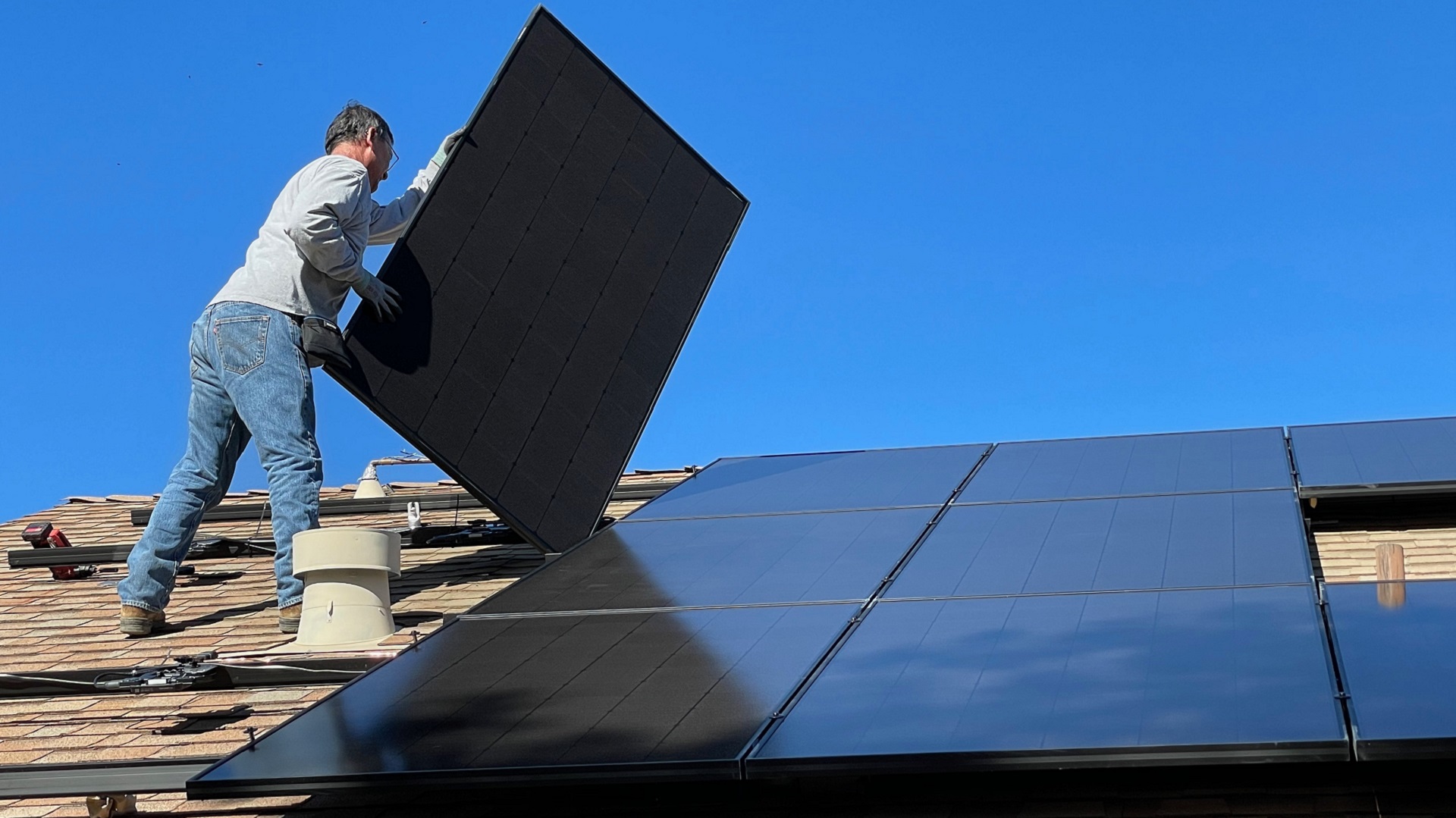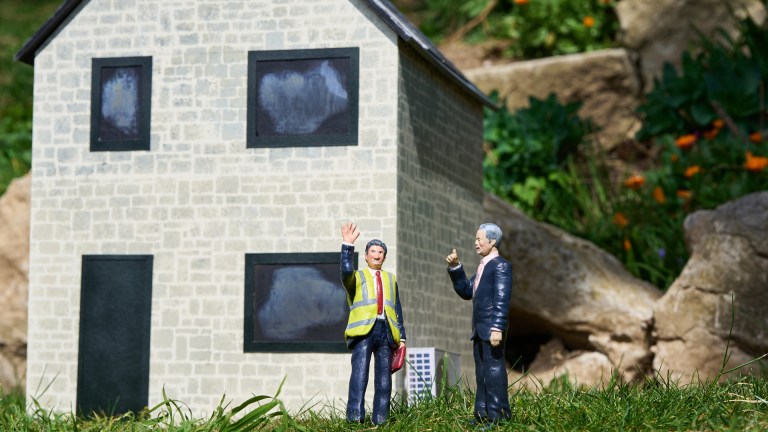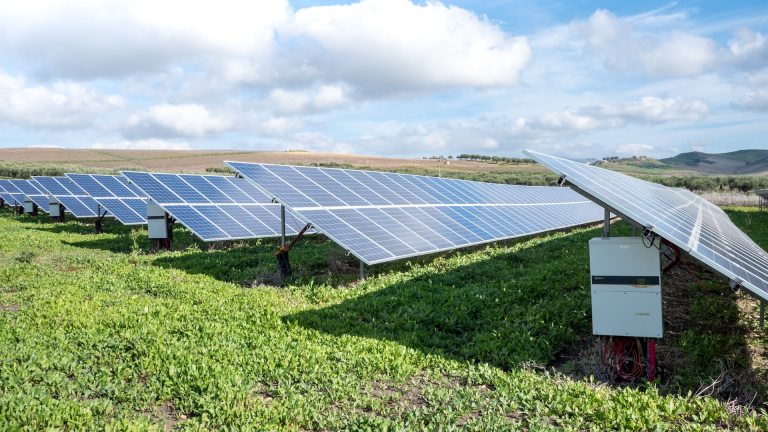“And then there’s a huge potential for all the organisations that are looking to offset as part of their decarbonisation strategy. A lot of organisations within the built environment won’t be able to get to net zero around just because of the work they do and they’ll need to offset whatever happens to be able to get to net zero.
“So we give them the chance to be able to buy UK-based carbon credits and to be able to buy carbon credits that are very close to where they work. That means that you’re bringing, you know, carbon emission reduction, but also communities together.”
Rishi Sunak’s recent net-zero policy U-turns may have reduced landlords’ obligation to pay to improve the energy efficiency of their homes, instead passing on the cost of leaky homes to private renters.
But efforts to insulate social housing have also been struggling to go at the speed needed to tackle the climate crisis.
The first wave of the government’s social housing decarbonisation fund was supposed to insulate 20,000 properties by March before the deadline was extended until June. The most recent statistics show 13,996 measures, including insulation, heat pumps and double glazing, had been installed in 7,960 households by the end of July.
The second wave of the social housing decarbonisation fund is set to reach 100,00 homes. Meanwhile, Energy Security and Net Zero Secretary Claire Coutinho announced an additional £80m for the fund to upgrade an extra 9,500 homes at the Tory party conference.
Advertising helps fund Big Issue’s mission to end poverty
With the UK having the oldest and draughtiest housing stock in Europe, it is clear that it will take more than just the state to reduce household emissions, which make up more than a quarter of the UK’s total carbon footprint.
That’s where HACT’s carbon credits project comes in.
HACT measures the carbon emission reduction from retrofit works in homes as well as the social value impact of the residents living in the property.
So that can track the impact of introducing loft or cavity wall insulation, or changing the heating system to an air-source heat pump, or introducing double-glazed windows, or using solar panels to generate power.
Once the impact is measured, it can be commodified: one tonne of carbon emission reduction is equal to one carbon credit.
Those credits can then be sold and HACT uses the proceeds to carry out further retrofit works on more homes to accelerate the process.
Advertising helps fund Big Issue’s mission to end poverty
To ensure that the process is having a positive environmental impact, HACT keeps a close eye on who it sells to. Pellet said carbon credits are often used to offset nature and energy-based projects in the Global South in places like Asia, Africa and South America but the HACT project can have an impact in the UK.
“We don’t currently sell any credits on the open market that mitigates against basically greenwashing,” said Pellet. “We don’t sell to super polluters or organisations that don’t look at decarbonizing their own corporate emissions.
“We believe offsetting should be an additional means to reduce carbon emissions, not the only way to go. We have set up an ethical framework, which means that there are certain set of rules for buying organisations to adhere to.
“So that is having a decarbonisation strategy to not be part of any sort of activities that are seriously detrimental to people like tobacco production, or weapons building.”
Your support changes lives. Find out how you can help us help more people by signing up for a subscription
The project is one of the UK finalists shortlisted for an Ashden Award for Energy Innovation in November. The Ashden Awards celebrate green solutions that innovate in the race to reach net zero.
Advertising helps fund Big Issue’s mission to end poverty
Dr Stephen Hall, head of awards at Ashden, said: “Our finalists are boundary-pushing pioneers cutting emissions and restoring nature. Crucially, they show how green jobs and community projects can drive a just transition and more equal society.
“This blows apart the ridiculous idea that net zero will make us all worse off. Politicians should put our finalists and other trailblazers at the heart of inclusive, ambitious plans for a sustainable future.
“They are taking on urgent national challenges, like upgrading homes and changing our relationship with the environment. But they can’t do it alone – investment and sympathetic policies are absolutely essential.”
Sunak’s recent U-turn on plans to retrofit has raised concerns the UK will not achieve its commitment of reaching net-zero by 2050.
With energy bills still causing fuel poverty and the growing need to adapt to a changing climate, Pellet said HACT’s project, which can work in both the social and private sector, is one of many that will be needed in a society-wide effort to tackle the challenges ahead.
Get the latest news and insight into how the Big Issue magazine is made by signing up for the Inside Big Issue newsletter
Advertising helps fund Big Issue’s mission to end poverty
“I know the current government can keep saying that they’re doing the most out of everybody ever. And yes, they are. But it’s nowhere near what needs to be done,” said Pellet.
“We’ve heard so many such sad stories over the course of the last year and before with the price of energy going up people are heating or eating.
“We heard one story from a housing association and it’s the most crazy, sad story that I’ve heard in a long time. They discovered after doing the retrofit works and trying to help this elderly lady that she’d only heated her home for six hours on one day last winter – and that was Christmas Day. She thought, ‘I’ll give myself a little bit of heating and enjoy Christmas Day’. I mean, can you imagine? It’s terrible.”
Do you have a story to tell or opinions to share about this? We want to hear from you. Get in touch and tell us more.










